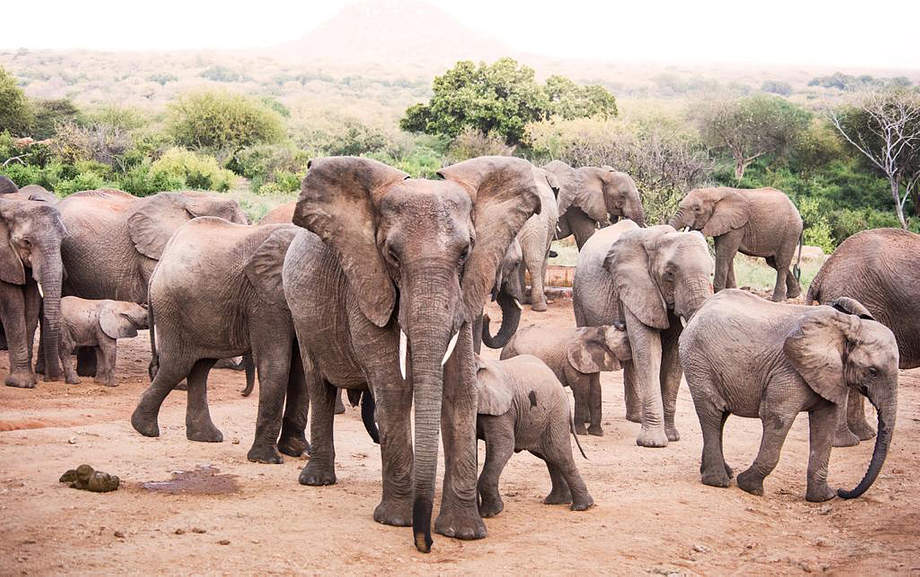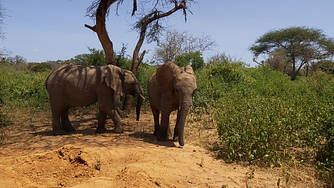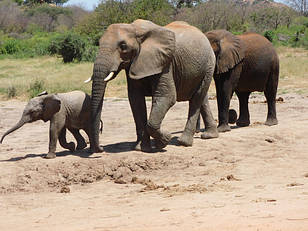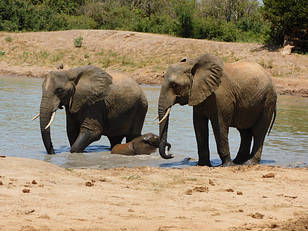Ithumba Reintegration Unit
Our wild-living orphans spend months away at a time, enjoying their freedom in Tsavo. This is exactly as it should be, but all the same, we are always thrilled when they stop by Ithumba to say hello. This month, we welcomed several bulls back into the fold, including 17-year-old Rapsu, 16-year-old Challa, and 15-year-old Zurura, as well as 18-year-old Tomboi who we had not seen since November.

Yatta and her herd, which includes Mulika, remained in the area, giving our dependent orphans ample opportunity to interact with their wild-born babies. Mulika’s baby, Mkuu, is just over a year old now, and the younger girls jostle for the privilege to nanny him. Little Esampu is particularly smitten, and one day, she nearly got left behind because she was enjoying playing with him so much. The dependent boys, meanwhile, love to roughhouse with the male wild-born babies, particularly Nusu, Nasalot's calf, and Yoyo, Yatta's youngest. While these rascals are always up for a game, their protective older sisters, like Yetu, and their nannies are very strict in granting access to them!
While Yatta’s herd tends to pop in for a few hours at a time, Mutara’s herd — which consists of Sities, Suguta, Kainuk, Turkwel, Kithaka, Garzi, and Lemoyian — often spend the entire day with the dependent herd. This is probably because the females are besotted with the youngest Ithumba orphans, particularly Dololo. They arrive at the stockades at dawn and patiently wait to escort the herd out for the day. The Keepers have to be extra vigilant when Mutara’s herd is around, because given the opportunity, they would certainly abscond with their beloved Dololo. One day, Suguta managed to do just that, but she was located a short while later, looking rather sheepish with the little boy by her side. The older girls’ affection for Dololo is very much reciprocated, and he took it personally when Suguta decided to browse with Musiara one day. Suguta realised that she had caused drama and quickly distributed her attention equally between them.
Because we are not privy to their private conversations, sometimes the orphans leave us perplexed. For instance, we were not sure why Makena showed up at the end of the month without the rest of Yatta’s ex orphan herd. As a mature 15-year-old, she immediately assumed control of the dependent orphans and led them through the bush. At one stage, she tried to direct them to the mud bath well before the feeding time, a decision which the Keepers obviously opposed. This led to an excitable few minutes, before Makena succeeded in calming everyone down. Over the next few days, she returned, again without Yatta’s herd, but in the company of wild-living bulls Kibo and Kilaguni. Makena is about halfway through her first pregnancy, so perhaps she is trying to establish a little splinter herd before having her calf next year. Orwa is another orphan who has shaken up his social circle; while he was previously inseparable with Bomani, he now splits his time among different herds.
Like Esampu, Roi is infatuated with the wild-born babies. She seemed inspired by Ukame’s recent decision to join Yatta’s ex orphan herd and act as a doting nanny. This month, Roi actually spent an entire day off in Tsavo with them, but when they stopped by the stockade compound in the afternoon, Roi chose to remain behind and wait for her friends to return home for the evening. This is how the reintegration process unfolds for most orphans; it begins with hours and then days away from the dependent herd, until they join the ex orphans once and for all. Mteto is another orphan who has been testing the waters, largely driven by her quest to spend as much time as possible with Wendi’s baby, Wema.
Namalok, who is six years old, just like Ukame, felt inspired to join the ex orphans at the same time that she did. He has always done things his own way; since we rescued Namalok, he eschewed bottles and refused to drink milk from anything besides his personal bucket. Now, he is forging his own path in Tsavo, ably supported each step of the way by our ex orphans. He is absolutely thriving, but he still returns to browse with his dependent friends every now and then. One day, when a host of wild bulls were pursuing the females in Yatta’s ex orphan herd who were evidently in season, Namalok opted to link up with the dependent orphans for the rest of the afternoon, so as to avoid all the commotion brought about by these amorous visitors.
A number of the older, dependent orphans are still exploring the ways of the wild. Jotto and Enkikwe spent a day in the company of the ex orphans, before returning home for their milk bottles in the evening. Other times, they exert their independence through small rebellions, like sneaking away from the Keepers just before everyone is due to head home for the evening. Barsilinga, Enkikwe, and Galla are classic candidates for this kind of thing, but Oltaiyoni, Gazi, Rapa, Ndiwa, and Mteto have started doing it as well. It is usually just because they want to extend their time browsing in the bush, and they always return of their own accord later in the evening. One day, however, Barsilinga, Enkikwe, and Galla snuck back to the stockades early in the hopes of getting extra dairy cube supplements. The Keepers were wise to their game and made the boys wait for their friends, so everyone could enjoy the delicious snack at the same time.
Ambo still marches straight out to the bush in the morning without so much as a backward glance. Usually, his adopted big sisters Oltaiyoni, Naseku, Kamok, and Siangiki follow him out, eager to chaperone their precious boy. If, for some reason, no one opts to join him, Ambo rumbles his disapproval and demands that some of his friends accompany him! We were pleased to see that he and Jotto rekindled their friendship this month. They were best friends at the Nursery, but Ambo’s small stature means that he is a little mollycoddled by the older females at Ithumba, while Jotto spends more time with the other bulls.
Esampu remains the queen of funny antics, proving that not much has changed since she was at the Nursery! Anything might provoke a charging game, such as a flock of guinea fowls, but sometimes she just initiates one for no reason at all — she starts charging and trumpeting just to get attention. Everyone is used to Esampu’s dramatics and allows her to get on with them, knowing she will tire herself out eventually.
Any day, the wild-living orphans might wander off and not return for weeks or months at a time. At the moment, we are just enjoying their company while they choose to remain in the area with their little ones. We know the dependent orphans feel the same way, as they light up when their older friends come by. While our orphans, dependent and wild-living alike, are at different stages of their lives, it is wonderful to see how well everyone gets along and supports each other, just like a true family.


